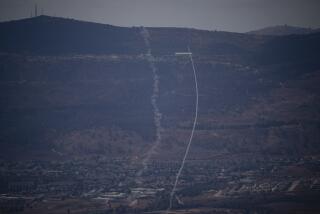Christopher, Rabin Renew Efforts for Peace With Syria
TEL AVIV â A day after a long-awaited breakthrough in Israeli-Palestinian peace efforts, the United States and Israel on Friday announced a new push for peace on a second front with Syria.
Secretary of State Warren Christopher will leave Israel today for a meeting with President Hafez Assad and other senior Syrian officials in Damascus. Christopher will present a set of ideas outlined by Israeli Prime Minister Yitzhak Rabin at daylong talks here.
âThe completion of the Gaza-Jericho agreement to be signed on Wednesday (by Israel and the Palestinians) will be only one step, but an important step, to facilitate the progress in the other negotiations that are necessary to achieve a comprehensive peace,â Christopher said at a news conference with Rabin. âWe now need to make progress on the Syrian track.â
With the latest step, Israel has clearly emerged as the engine behind the broader Mideast peace process. First in secret talks with the Palestine Liberation Organization last year, and now, in a public effort with Syria, Rabin government initiatives have injected a sense of urgency--and brought results--to a process launched almost three years ago in Madrid.
But brokering peace with Syria could prove to be as complicated and potentially more difficult than the deal with the Palestinians. âWeâve got a lot of hard work ahead of us,â Christopher said at the news conference.
A senior U.S. official later added: âWeâre not on the brink of a breakthrough. There are a lot of tough decisions that will have to be made by both sides. This is a process where you work to build base lines, determine what the options are, and then narrow the universe of what the possible solutions are.â
Christopher and Rabin refused to disclose details of the Israeli proposal. Rabin said only that the ideas included âa comprehensive overview, including the substance of peace, the principle of withdrawal (from the Golan Heights) . . . the stages and a reference to their implementation by each side, and also demands of the American side.â
Israeli media reported this week that Rabin wants a phased withdrawal to culminate in a âfullâ peace, including open borders, trade and an exchange of ambassadors with Syria. One newspaper reported the government is also seeking a U.S.-led force of 3,000 troops in a buffer zone between the two longtime rivals.
U.S. officials denied that Israel had made a specific request but acknowledged that the two sides had explored the issues of peacetime security at length.
In their talks, Rabin also told Christopher that Syria had to undertake measures proving to the Israeli public that Damascus wanted peace, according to Rabin spokesman Obed Ben-Ami.
âIt is hard to face somebody who says he wants peace but will not talk to you, that is, (refuses) substantive, serious talk,â Rabin was quoted as telling Christopher.
Indeed, on the eve of Christopherâs arrival, Syria pledged Friday not to succumb to any outside influence intended to win concessions on the pivotal issue of the Golan Heights. Damascus has demanded the return of the strategic plateau occupied by Israel in the 1967 Mideast War.
âWhat is being rumored about the possibility that Syria may be affected by pressure and seduction to accept compromises is untrue,â wrote Al Baath, the newspaper of Assadâs ruling Baath Arab Socialist Party. âSyriaâs firm stand has not deviated from the basis of the peace process.â
Yet Syria is also showing unprecedented interest in pursuing peace with its formal archrival, U.S. officials said.
In recent weeks, Damascus has quietly taken steps indicating that it is willing to back its rhetoric on peace with action in Lebanon. For more than a decade, Lebanon has been a troublesome border for Israel. The tumult is often blamed on Syria as more than 30,000 Syrian troops effectively control large areas of eastern and southern Lebanon.
But in hopeful signs for peace:
* Syria has arrested more than two dozen members of the notorious Abu Nidal extremist organization in Lebanon, as well as closing some of its facilities in Beirut and the eastern Bekaa Valley, U.S. officials said.
* Syria has cracked down on Hezbollah operatives linked to extremist actions against Israel. The pro-Iranian Party of God has been one of the most persistent problems for Israel along its border with Lebanon.
* Assadâs security forces arrested diplomats accused of murdering an Iraqi dissident in Beirut two weeks ago.
* And Damascus has not intervened in the arrest of a key Syrian ally in Lebanon, right-wing Christian leader Samir Geagea, who has been tied to the bombing of a Maronite church last month.
In several of these cases, extremists arrested by Syria were turned over to Lebanese authorities--leading Israel to complain that the latest moves are inadequate steps to prove new intent and commitment.
But Christopher said he believes that Syria will listen. âI expect the conversations there to be as serious and substantive as the conversations here,â he said.
More to Read
Get the L.A. Times Politics newsletter
Deeply reported insights into legislation, politics and policy from Sacramento, Washington and beyond. In your inbox three times per week.
You may occasionally receive promotional content from the Los Angeles Times.










